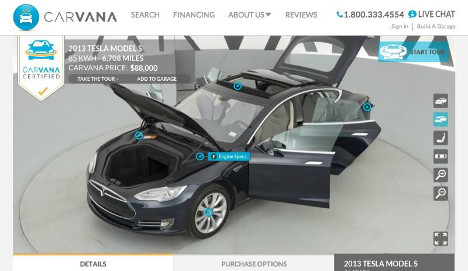Carvana Certified Pre-Owned Tesla Debuts

2013 Tesla Model S on Carvana.com
By subscribing, you agree to receive communications from Auto Remarketing and our partners in accordance with our Privacy Policy. We may share your information with select partners and sponsors who may contact you about their products and services. You may unsubscribe at any time.
ATLANTA –
Online auto retailer Carvana announced Friday that what it’s calling the first Carvana certified pre-owned Tesla is now available on its website.
The vehicle is a 2013 Tesla Model S and can be found at www.carvana.com.
(Carvana also clarified that the CPO offering is via Carvana.com, versus coming directly from Tesla)
Carvana says the Model S is the first of many Tesla cars that will be available on the site, adding that it is the first online retailer to allow shoppers to shop, buy and finance Telsas completely online.
“We’re excited to offer the first certified pre-owned Tesla that is available for sale and delivery nationwide”, says Ernie Garcia, president of Carvana.
“There has been a lot of news recently around the regulatory limitations Tesla has faced selling their cars in certain states, but because of our unique business model we are able to sell pre-owned Tesla’s to anyone, anywhere,” Garcia added.
Subscribe to Auto Remarketing to stay informed and stay ahead.
By subscribing, you agree to receive communications from Auto Remarketing and our partners in accordance with our Privacy Policy. We may share your information with select partners and sponsors who may contact you about their products and services. You may unsubscribe at any time.
Indicating that retail prices on pre-owned Telsas have hit record highs, Carvana said its initial model will be up for $88,000. The car is covered by Carvana Certified’s 100-day/4,189-mile bumper-to-bumper warranty as well as a seven-day “test-own” return policy.
Tesla is no stranger to the news, as of late, for its alternative method for retailing vehicles.
Just last month, a trio of Federal Trade Commission staffers released a blog post asserting car shoppers should be able to decide how they shop for their next vehicle, in regards to the ongoing controversy and legal battle Tesla’s direct-to-consumer sales model has sparked in the dealer community.
It didn’t take long for NADA to respond to the post. A press release from the dealer organization soon followed, claiming the individual states should, in fact, decide how consumers shop for new cars.
NADA claimed that the in implying consumers should be able to choose whether they want to visit a dealership or buy directly from the automaker the FTC staffers “failed to acknowledge how the franchised dealer network actually benefits car buyers through price competition and safety, and provides enormous economic benefits to local communities.”
In the NADA release, Jonathan Collegio, NADA vice president of public affairs, was quoted saying, “For consumers buying a new car today, the fierce competition between local dealers in a given market drives down prices both in and across brands — while if a factory owned all of its stores it could set prices and buyers would lose virtually all bargaining power. And buying a car isn’t like buying a pair of shoes online. Cars require licensing to operate, insurance and financing to take home, and contain hazardous materials, so states are fully within their rights to protect consumers by standardizing the way cars are sold.”
The authors of the original FTC blog post — Andy Gavil, director of the Office of Policy Planning; Debbie Feinstein, director of the Bureau of Competition; and Marty Gaynor, director of the Bureau of Economics — began by focusing on how sales and consumer behavior is always evolving.
They gave the following example, as stated in the blog post: “Consumers once shopped predominantly at their local stores; but first mail order catalogs and today the Internet have created new ways to shop for and purchase a wide range of goods and services. Similarly, consumers once arranged for taxis by hailing one from a street corner or by calling a dispatcher; yet today, smartphones and new software applications are shaking up the transportation industry, creating new business opportunities and new services for consumers.”
The authors contend that the same evolution is being stalled in the business of buying cars, due to local laws in many states that require consumers to buy cars from licensed auto dealers.
Carvana's approach, it would seem, is cut from a similar, if not the same, cloth.
The Phoenix-based company operates out of Atlanta and says it is the “first complete online auto retailer that allows consumers to shop, finance and purchase a car entirely online, and have it ready for home delivery or pick-up at the nation's first vending machine as soon as the next day.”
In essence, it offers a platform for shoppers to browse vehicles, find financing and coordinate delivery all online.
Staff writer Sarah Rubenoff contributed to this report.


